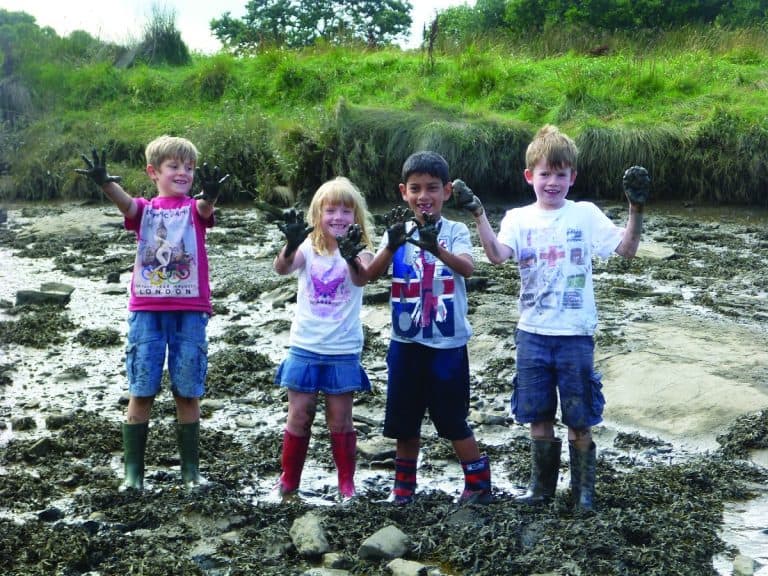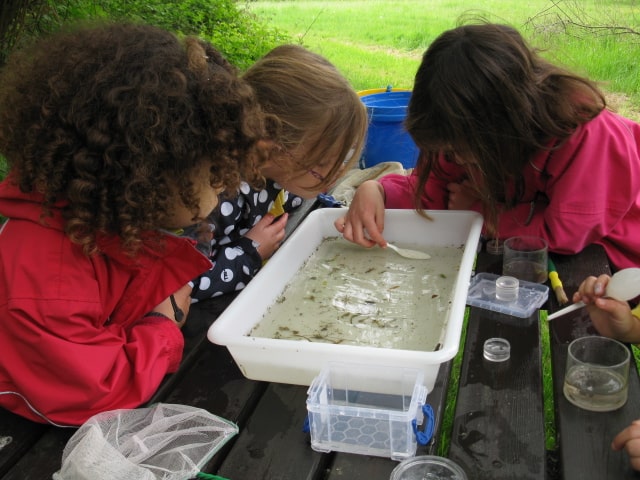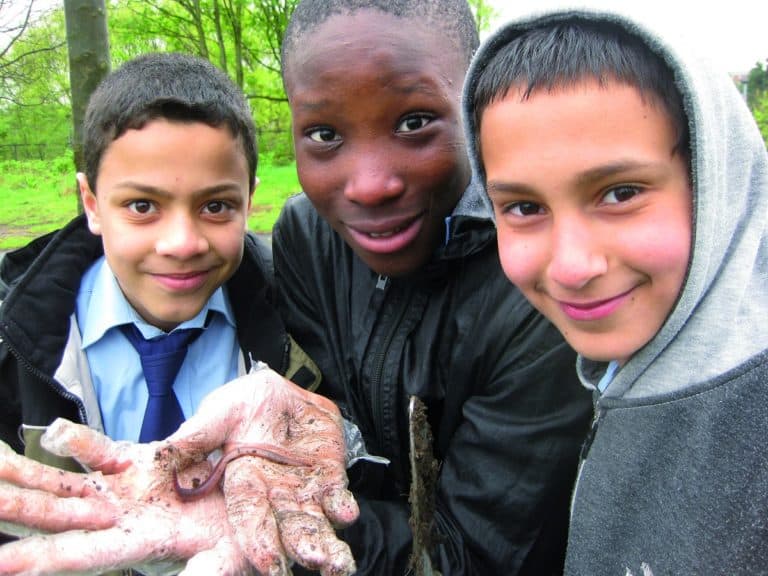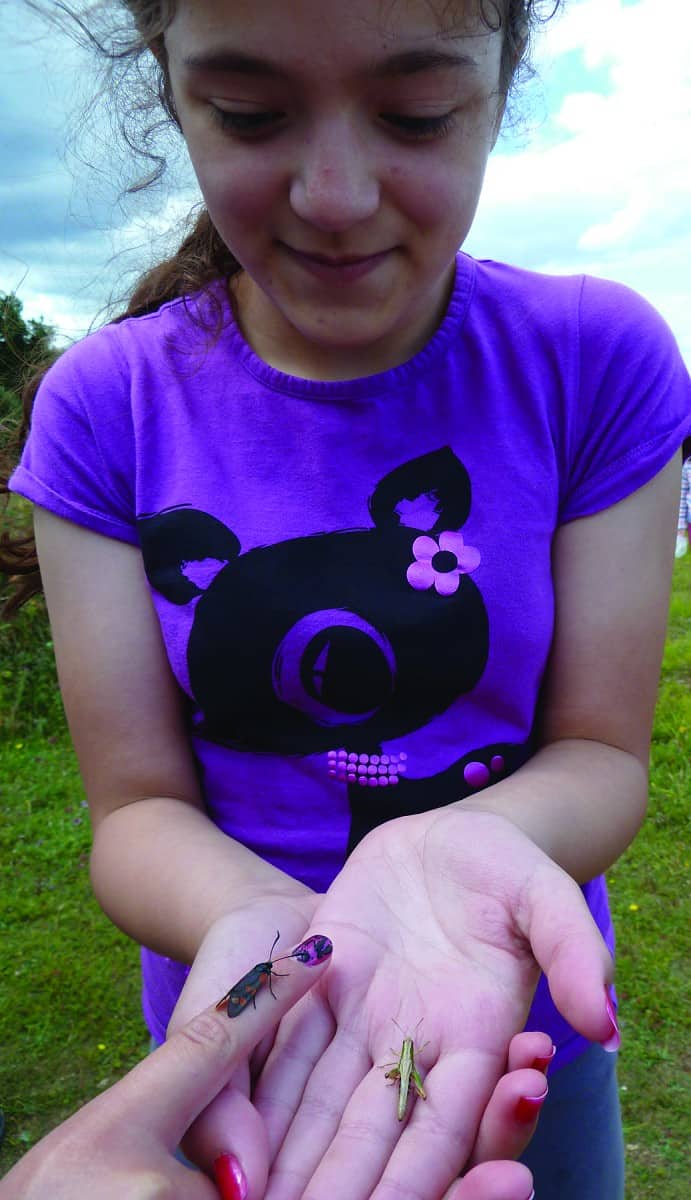Project dates: 2019-2022
Funder: Department for Education, with support from the Department for Environment, Food & Rural Affairs and Natural England
Despite disruptions to education over the first year of the project, Nature Friendly Schools worked with 90 schools, enabling 16,000 pupils to benefit from learning in nature, trained 500 teachers in outdoor learning and supporting pupil’s mental health – and transforming 30 school grounds.
Nature Friendly Schools year 1 stories:
“Nature Friendly Schools has been transformative for our pupils and our school. Every class now spends at least an hour learning outside each day in our forest school area, which is brilliant for the children. Their senses come alive, encouraging creativity and confidence. After the year children have had – much of the time being stuck at home and away from their peers – learning and playing together in nature isn’t just helpful – it’s essential.”
Stephanie Dowley, Headteacher at John Randall Primary in Telford
Burlington Junior School in Yorkshire renovated a neglected pond and held classes in nearby woodland as part of their participation in Nature Friendly Schools. Teacher Matthew Clark, who led the project, said many students came out of their shell when learning outside. He said:
“Some pupils don’t get talk about their feelings at home, while others feel hemmed in inside a classroom. Being outdoors gives them the opportunity to think and feel and express themselves in different ways.”
“Nature Friendly Schools has been so beneficial for our pupils and our school. Many children come into school with different anxieties, but when they’re learning outside, they are present in the moment, and their worries just seem to fade away. Being outdoors also works wonders for their creativity and enthusiasm for learning – and improves behaviour as well. Learning in nature has become a keystone part of their education.”
Kim Leathy, Teacher at Westminster Academy in Blackpool
Nature Friendly Schools year 2:
The second year of the Nature Friendly Schools project began in April 2021. Over the following 12 months the project partnership developed teachers’ confidence and ability to drive forward outdoor learning in 90 schools in areas experiencing disadvantage across England.
Through training, mentoring and a CPD journey Nature Friendly Schools staff empowered teachers to deliver outdoor learning independently. Supporting them to overcome barriers and challenges to deliver outdoor learning in their settings. Including making the most of limited outside space, managing behaviour outdoors, and helping teachers measure the impact of outdoor learning.
The project worked with school staff and pupils to ‘green’ their school grounds, creating outdoor classrooms and greener, more natural spaces around school buildings. FSC hosted 33 overnight residential visits to schools taking part in the project, enabling over 1000 children and young people to take part in a residential experience with FSC. Many of whom would not have had this experience without the Nature Friendly Schools project.
Teacher quotes from NFS residentials:
“Pupils had become significantly more risk adverse since the pandemic began and that taking part in outdoor learning as part of a residential had a positive impact on the pupil’s resilience.”
“The children are settled, as a class, even more than they were before we went. They seem more at ease with each other, and I have noticed that some of our more vulnerable children have a more focused and determined attitude since returning from the residential.”
Between summer 2019 and the end of the project in March 2022 FSC worked with 188 Primary, Secondary and Special schools and Alternative Provision Institutions across England.
- Developing training resources to introduce 1000+ teachers to outdoor learning.
- Delivering 28 live CPD (Continuing Professional Development) webinars to 400+ school staff, supporting them to be confident to deliver deliver outdoor learning in their school grounds.
- Posting 8500+ FSC fold-out wildlife guides to school taking part in the project
- Providing tailored support to 45 schools identified as needing additional support and project resources.
- Hosting 33 fully funded NFS residentials across 6 FSC locations,
What lessons should FSC take from Nature Friendly Schools and embed across the charity?
Personalised learning
Feedback during Nature Friendly Schools demonstrates that teachers want personalised support; FSC should consider the best ways to encourage personalised conversations with teachers and support for teachers, encouraging the integration of fieldwork and outdoor learning linked to the curriculum (or extracurricular) and supporting them to develop their skills.
Proactive inclusivity in fieldwork
Work with teachers and learners to take steps to ensure all pupils feel able reach their potential during FSC fieldwork by sharing strategies to support the mental health and wellbeing of all our visitors, including staff training.
There is potential to build on the success of NFS to help us reach out and engage with schools that are currently less likely to engage with FSC.
FSC are looking forward the publication of the Nature Friendly Schools project report and to sharing more then.
Project Details
Example Timetable
| Day | Morning – 9am start | Afternoon 1pm start | Evening 7pm start |
| 1 | 12.00-12:30 Arrival School arrives and enjoys packed lunch brought from homewith time to unpack, settle in. Teachers meet with FSC Tutor to double check arrangements and requirements. | 13:00 Building a team What makes a good team? Pupils work in groups and consider what makes a good team and team member. 14:30 Drink/snack break 14.45 Game time 2! Pupils completi a variety of challenges in the centre grounds. 16:15 Whole team challenge Applying team work and group review *17.30- 18.15 Dinner And time to settle into bedrooms | 19:00 Campfire cook out – cook outside on the fire. Time to reflect on the afternoons activities and look forward to tomorrow. Cook an evening snack on an open fire and sing some campfire songs! Staff should bring along their singing voices and songs! |
| 2 | *08.00 Breakfast Make/collect packed lunches 9:00 Exploring the local landscape Investigating the landscape at different scales. 10:00 Investigating a stream What is this stream like? How might it change? 10:30 Digging deeper The river habitat. Students will have opportunity to design a short investigation into the animals (invertebrates) 11.30 Walk back to FSC centre | 13:00 Departure |
*We will try to adhere to these times where possible, however due to COVID-19, timings may change to ensure appropriate time for cleaning and preservation of distinct ‘bubbles’.
Activities/sessions may change due to unforeseen circumstances, such as weather or staff availability. We will always do our best to find a suitable alternative.





